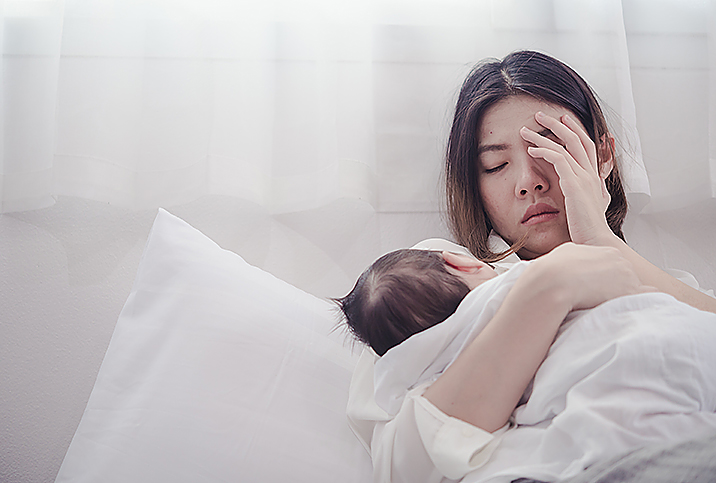The Fine Line Between Motherhood Woes and Postpartum Depression

Giving birth is an emotional experience. Most women have ups and downs during the early days of motherhood. However, if these feelings linger or become severe, you may be suffering from postpartum depression.
What are motherhood woes?
Mood swings after the birth of a baby are not uncommon. Approximately 70 to 80 percent of new moms report feeling sad after giving birth. The exact cause is unknown, but hormonal changes from pregnancy and adjusting to life with a newborn are likely contributors. Moms may feel down throughout the day, but the sadness generally goes away within a couple of weeks.
Symptoms of motherhood woes
Symptoms of woes generally last from several days to a few weeks after giving birth, and can include anxiety, sadness, crying, feeling overwhelmed, irritability, trouble sleeping, mood swings, reduced concentration and appetite changes.
Coping strategies for new moms
Mood swings for new moms usually resolve without treatment. To manage the emotional roller coaster during the first few weeks of motherhood, you can try these self-care recommendations:
- Ask for help from your partner, friends or family
- Avoid alcohol and drugs
- Connect with other moms for support
- Get outside as much as possible for fresh air, natural light and exercise
- Rest and sleep when you can
- Try to eat consistent and healthy meals
What is postpartum depression?
Postpartum depression symptoms are more intense and long-lasting than those associated with motherhood woes—sometimes interfering with a mother's ability to bond or care for her baby. Approximately 15 percent of women develop this type of depression after birth.
Postpartum depression may be overlooked and can continue for months or more without proper treatment. Just as with motherhood woes, research suggests rapid changes in hormones during and after pregnancy contribute to postpartum depression. Women are at increased risk if they or someone in their family has a history of depression or mood disorders, if they have experienced stressful life events in addition to the pregnancy, or if they lack support.
Postpartum depression symptoms
Symptoms of postpartum depression can last many months and may not begin until months after childbirth, so it's vital to stay aware if you're experiencing:
- Appetite changes
- Depressed mood or severe mood swings
- Difficulty bonding with your baby
- Excessive crying
- Fear that you're not a good mother
- Feelings of worthlessness, shame, guilt or inadequacy
- Hopelessness
- Intense irritability and anger
- Lack of pleasure in activities you once enjoyed
- Overwhelming fatigue or loss of energy
- Recurrent thoughts of death or suicide
- Restlessness
- Severe anxiety and panic attacks
- Sleep changes
- Thoughts of harming yourself or your baby
- Trouble thinking clearly or making decisions
- Withdrawal from family and friends
Treatment for postpartum depression
Antidepressants or anti-anxiety medications, psychotherapy and support groups may be part of your treatment plan for postpartum depression, based on the severity of your condition and the symptoms you're experiencing.
The same self-care encouraged for most moms is recommended for those with postpartum depression. Self-care alone will not heal postpartum depression but can enhance treatment.
One of the most dangerous symptoms of postpartum depression is thoughts of suicide or harming the baby. Moms experiencing these feelings should seek help right away by reaching out to a loved one, calling a healthcare or mental health provider or calling 911/local emergency. In the United States, you can call the National Suicide Prevention Lifeline at 1-800-273-TALK (8255).
Postpartum depression screening
OB-GYNs give a postpartum depression screening as part of a routine postpartum checkup or if the mother is showing concerning signs after giving birth. The screening generally includes questions about mood and anxiety. If postpartum symptoms are present, the provider may check thyroid levels to rule out low thyroid, which looks similar to depression. If a mom is at risk or has been diagnosed with depression before pregnancy, doctors can evaluate mental health throughout the pregnancy so treatment can begin right away.
Motherhood woes can dampen the joy of having a newborn, but only for a short time. Undiagnosed postpartum depression can have more harrowing and long-term consequences to a mother's health and ability to bond with her baby. Recognizing the difference is critical to ensuring appropriate treatment.
















